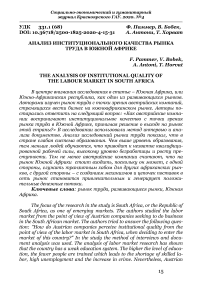Анализ институционального качества рынка труда в Южной Африке
Автор: Паммер Ф., Бобек В., Антони А., Хорват Т.
Журнал: Социально-экономический и гуманитарный журнал Красноярского ГАУ @social-kgau
Рубрика: Экономика
Статья в выпуске: 4 (18), 2020 года.
Бесплатный доступ
В центре внимания исследования в статье - Южная Африка, или Южно-Африканская республика, как один из развивающихся рынков. Авторами изучен рынок труда с точки зрения австрийских компаний, стремящихся вести бизнес на южноафриканском рынке. Авторы постарались ответить на следующий вопрос: «Как австрийские компании воспринимают институциональное качество с точки зрения рынка труда в Южной Африке, принимая решение о выходе на рынок этой страны?» В исследовании использовали метод интервью и анализа документов. Анализ исследований рынка труда показал, что в стране слабая система образования. Чем выше уровень образования, тем меньше людей обучаются, что приводит к нехватке квалифицированной рабочей силы, высокому уровню безработицы и росту преступности. Тем не менее австрийские компании считают, что на рынок Южной Африки стоит входить, поскольку он может, с одной стороны, служить транзитным хабом для других африканских рынков, с другой стороны - с созданием механизмов и цепочек поставок в сеть рынок становится привлекательным и генерирует положительные денежные потоки.
Рынок труда, развивающиеся рынки, южная африка
Короткий адрес: https://sciup.org/140256961
IDR: 140256961 | УДК: 331.1 | DOI: 10.36718/2500-1825-2020-4-15-31
Список литературы Анализ институционального качества рынка труда в Южной Африке
- Bhorat, H., Naidoo, K., & Yu, D. (2014). Trade unions in an emerging economy the case of South Africa. WIDER. http://www.wider. unu.edu/publications/working-papers/2014/en_GB/wp2014-055.
- Claassen, A., & Du Toit, J. (n.d.). Payment of Bonuses. Retrieved 8 January 2019, from https://content.next.westlaw.com/Document /I02064f4a1cb6ne38578f7ccc38dcbee/View/FullText.html?mntextData =(sc.Default)&transitionType=Default&firstPage=true&bhcp=1.
- Cridian, D., Kennedy-Good, S., Forbes, E., & Chavoos, M. (2017). Employee share plans in South Africa: Regulatory overview. Thomson Reuters. https://content.next.westlaw.com/Document/I02064f4a1cb611 e38578f7ccc38dcbee/View/FullText.html?contextData=(sc.Default)&tra nsitionType=Default&firstPage=true&bhcp=1.
- Department of Higher Education and Training South Africa. (2019). Skills Supply and Demand in South Africa (p. 103). Department of Higher Training and Education South Africa. www.dhet.gov.za.
- Dermol, V. (2010b). Vplivi usposabljanj na ucenje v podjetju in na njegovo uspesnost. Celje: International School for Social and Business Studies.
- Döring, N., & Bortz, J. (2016). Forschungsmethoden und Evaluation in den Sozial- und Humanwissenschaften (5. vollständig überarbeitete, aktualisierte und erweiterte Auflage). Springer.
- Education First Ltd. (2018). EF English Proficiency Index (p. 49). Education First Ltd.
- Goitron, H. (2015). Protection of Trade Secrets: South Africa. l. https://www.loc.gov/law/help/tradesecrets/southafrica.php.
- Hofstede, G. (n.d.). Hofstede's Dimensions. Https://Www.Hofst edeInsights.Com/Models/National-Culture/. Retrieved 8 October 2019, from https://www.hofstede-insights.com/models/national-culture/ Se-gatti & Landau, 2011, p. 71).
- Horvat, T. (2015). Corporate social responsibility depending on the size of business entity. In: D. Gomezelj Omerzel, and S. Laporsek, ed., Managing sustainable growth : proceedings of the joint international conference organised by University of Primorska, Faculty of Management, Slovenia, Eastern European Economics, USA, and Society for the Study of Emerging Markets, USA. Koper: Faculty of Management, pp. 339-353.
- Horvat, T. and Lipicnik, M. (2016). Internal audits of frauds in accounting statements of a construction company. Strategic management, 2(4), pp. 29-36.
- International Monetary Fund, Mlachila, M., & Moeletsi, T. (2019). Struggling to Make the Grade: A Review of the Causes and Consequences of the Weak Outcomes of South Africa's Education System (p. 61) [Working Paper].
- Jacques Bughin, James Manyika, Jonathan Woetzel. (2018). Outperformers: High-Growth Emerging Economies and the Companies that propel them (September 2018).
- Khanna, T., Palepu, K. G., & Bullock, R. J. (2010a). Winning in emerging markets: A road map for strategy and execution. Harvard Business Press.
- Khanna, T., Palepu, K. G., & Bullock, R. J. (2010b). Winning in emerging markets: A road map for strategy and execution. Harvard Business Press.
- Korez-Vide, R., Voller, P. & Bobek, V. (2014). German and Austrian Foreign Direct Investment in Brazilian Regions: Which are the Location Choice Factors? Journal of Management and Strategy, 5(4), 68-81. doi:10.5430/jms.v5n4p68.
- L&E Global. (2016). Restrictive Covenants in South Africa. https://knowledge.leglobal.org/restrictive-covenants-in-south-africa/
- Mayring, P. (2015). Qualitative Inhaltsanalyse: Grundlagen und Techniken (12., überarbeitete Auflage). Beltz Verlag.
- Mans-Kemp, N., & Viviers, S. (2018). Executive performance evaluation and remuneration: Disclosure and practices of selected listed South African companies (2002-2015). South African Journal of Accounting Research, 32(2-3), 154-173. https://doi.org/10.1080/10291954. 2018.1465149.
- Mlachila, M., & Moeletsi, T. (2019). Struggling to Make the Grade: A Review of the Causes and Consequences of the Weak Outcomes of South Africa's Education System (p. 61) [Working Paper]. International Monetary Fund.
- Montesdeoca, M., Sánchez Medina, A.J. & Blázquez Santana, F. (2019). Research Topics in Accounting Fraud in the 21st Century: A State of the Art. Sustainability, 11 (6), 1570. DOI: 3390^11061570.
- Nonaka, I., and Takeuchi, H. (1995). The Knowledge - Creating company. New York, NJ: Oxford University press. Oxford University Press.
- OECD. (2019). Better Life Index. http://www.oecdbetterlifeindex.org /countries/south-africa.
- Reischl Gerald. (2018a, November 26). Trending Topics. Austria Connect Afrika. https://www.trendingtopics.at/austria-connect-afrika-2018/
- Reischl Gerald. (2018b, November 26). Trending Topics II. https://www.trendingtopics.at/kapstadt-startups-silicon-cape-aussenwi-rtschaft.
- SARS. (2016). Closign a Business or Company. https://www.sars.gov.za/ClientSegments/Businesses/My-Bus-and-Tax/ Pages/ Closing-a-Business-or-Company.aspx.
- SchoemanLaw Inc. (2017). The process of liquidation. https://www.polity.org.za/article/the-process-of-liquidation-2017-07-06.
- What are the challenges? (n.d.). Doing Business in South Africa. Retrieved 28 April 2019, from http://www.southafrica. doingbusinessguide.co.uk/the-guide/what-are-the-challenges.
- World Economic Forum. (2018a). Global Competitiveness Index (4.0). World Economic Forum. http://reports.weforum.org/pdf/gci4-2018/WEF_GCI4_2018_Profile_ZAF.pdf
- World Economic Forum. (2018b). The Global Competitiveness Index 2017-2018 edition. World Economic Forum.
- World Bank Group. (2018). Doing Business in South Africa 2018 (p. 173). World Bank. http://www.doingbusiness.org/southafrica.


